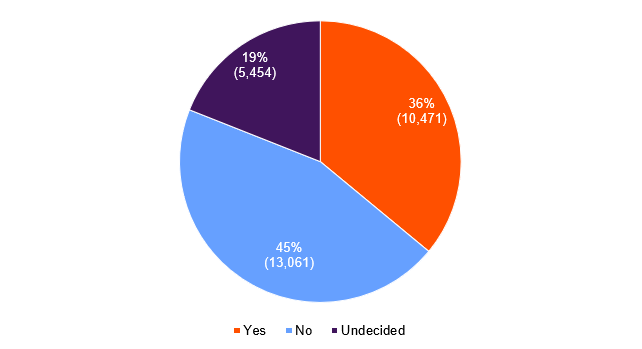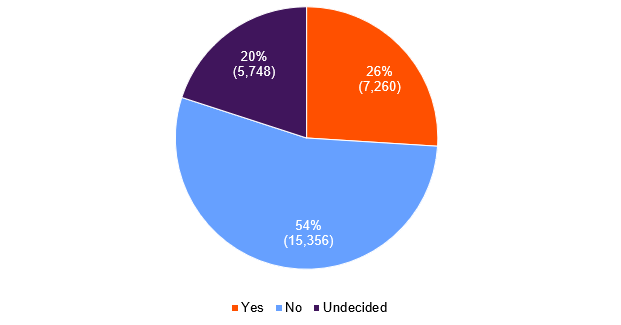Key results
Prescribing drugs for self-administration
The first section of the survey sought views on a change in the law to permit doctors to prescribe drugs for eligible patients to self-administer to end their own life.
What should the BMA's position be on a change in the law on prescribing drugs for eligible patients to self-administer to end their own life?
 Source: Kantar - 40% supportive, 33% opposed, 21% neutral, 6% undecided
Source: Kantar - 40% supportive, 33% opposed, 21% neutral, 6% undecided
Do you personally support or oppose a change in the law on prescribing drugs for eligible patients to self-administer to end their own life?
 Source: Kantar - 50% support, 39% oppose, 11% undecided
Source: Kantar - 50% support, 39% oppose, 11% undecided
Would you be willing to participate in any way in the process if the law changed on prescribing drugs for eligible patients to self-administer to end their own life?
 Source: Kantar - 45% no, 36% yes, 19% undecided
Source: Kantar - 45% no, 36% yes, 19% undecided
Administering drugs
The second section of the survey asked the same questions but in relation to a change in the law to permit doctors to administer drugs with the intention of ending an eligible patient’s life.
What should the BMA’s position be on a change in the law on doctors administering drugs with the intention of ending an eligible patient's life?
 Source: Kantar - 40% opposed, 30% supportive, 23% neutral, 7% undecided
Source: Kantar - 40% opposed, 30% supportive, 23% neutral, 7% undecided
Do you personally support or oppose a change in the law on doctors administering drugs with the intention of ending an eligible patient's life?
 Source: Kantar - 46% oppose, 37% support, 17% undecided
Source: Kantar - 46% oppose, 37% support, 17% undecided
Would you be willing to participate in any way in the process if the law changed on doctors administering drugs with the intention of ending an eligible patient's life?
 Source: Kantar - 54% no, 26% yes, 20% undecided
Source: Kantar - 54% no, 26% yes, 20% undecided
Trends in the results
- Members in Northern Ireland were generally more opposed than those in the other nations (no significant differences were found between members in England, Scotland and Wales).
- Members who are registered with a licence to practise in the UK were more opposed than those without a licence to practise.
- Overall, medical students were generally more supportive, and GPs generally more opposed, than most other branches of practice.
- These specialties tended to be generally more supportive: anaesthetics, emergency medicine, intensive care and obstetrics & gynaecology.
- These specialties tended to be generally more opposed: clinical oncology, general practice, geriatric medicine and palliative care.
About the survey response
- We heard from 28,986 members – 19.35% of all members who received an invitation to participate.
- This is higher than other surveys we have carried out of our full membership and higher than or in line with the typical market research response rate for this type of survey.
- This is one of the largest surveys of medical opinion ever carried out on this issue.
- This sample was broadly representative of our membership when assessed by nation, branch of practice and specialty with a few exceptions: GPs were slightly over-represented and junior doctors and medical students were slightly under-represented.
- In total we received 42,607 free text answers, each of which was read and analysed by the specialist team at Kantar.
- There were two ‘other, specify’ questions to which 2,368 responses were received.
- Any points that were raised by at least 5% of those providing free text answers to these questions are included in the report.
Why we did the survey
In June 2019, our RB (representative body) called on the BMA to “carry out a poll of members to ascertain their views on whether the BMA should adopt a neutral position with respect to a change in the law on assisted dying”.
It was intended to:
- give us a snapshot of our members’ views
- enable the RB to understand the views of our wider membership and the reasons for them more broadly
- help to inform a future policy debate.
In addition to informing our policy debate, the additional information provided through the survey will put us in a stronger position to engage on behalf of our members in the event of any future proposals for legislative change.
This debate was originally planned for June 2020 but, due to the COVID-19 pandemic, was delayed, to ensure there is time for a considered, in-depth debate.
In order not to detract from the immediate, pandemic-related issues that were debated at the 2020 virtual ARM in September, it was decided to delay publication of the survey’s results until after that meeting had taken place.
Learn more about physician-assisted dying
Physician-assisted dying refers to doctors’ involvement in measures intentionally designed to end a patient’s life, covering the below situations.
- Where doctors would prescribe lethal drugs at the voluntary request of an adult patient with capacity, who meets defined eligibility criteria, to enable that patient to self-administer the drugs to end their own life. This is sometimes referred to as physician-assisted dying or physician-assisted suicide.
- Where doctors would administer lethal drugs at the voluntary request of an adult patient with capacity, who meets defined eligibility criteria, with the intention of ending that patient’s life. This is often referred to as voluntary euthanasia.
Eligibility
Eligibility for physician-assisted dying would be set out in any piece of legislation brought forward in the future. For the purposes of this survey we assumed that the criteria would fall within the following boundaries to cover patients who:
- are adults
- have the mental capacity to make the decision
- have made a voluntary request
- have either a terminal illness or serious physical illness causing intolerable suffering that cannot be relieved.
All forms of assisted dying are illegal in the UK.
- Situations where a doctor would administer lethal drugs at the request of a patient (often referred to as euthanasia) could be prosecuted as murder or manslaughter (culpable homicide in Scotland).
- Situations where a doctor would supply lethal drugs for a patient to self-administer are covered by a specific offence of 'assisting or encouraging' suicide in England, Wales and Northern Ireland and by the common law in Scotland.
We produced briefing materials to inform respondents to the survey, including:
- information about the law in the UK and how it has developed
- an overview of the law in jurisdictions internationally where physician-assisted dying is permitted
- some of the arguments used by supporters and opponents of physician-assisted dying, and for and against the BMA adopting a neutral position
- an overview of recent surveys of medical and public opinion on physician-assisted dying.
Download original briefing pack
For more up-to-date briefing materials, click here.

